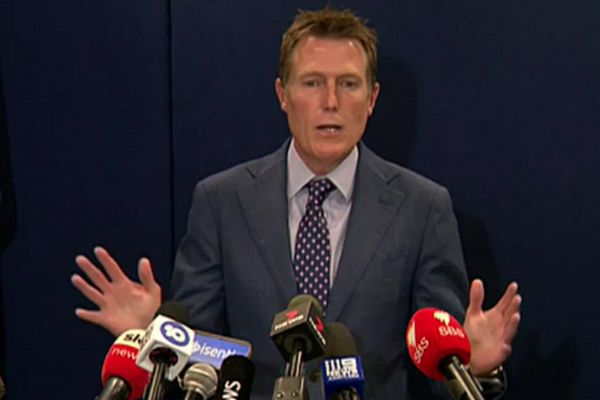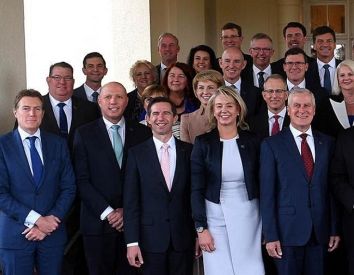The Morrison Government claims it takes sexual assault allegations seriously, only to file them for posterity, sending the message that victims are not to be trusted, writes Dr Binoy Kampmark.
*CONTENT WARNING: This article discusses rape
THE FEDERAL GOVERNMENT, it was alleged this week, sported an offender.
A dossier had been circulated, running into 31 pages outlining allegations that in 1988, a woman was raped by a current member of the Cabinet. Only a select number of political figures received the letter: Prime Minister Scott Morrison, Greens Senator Sarah Hanson-Young and Labor Senate Leader Penny Wong. To add another snag to the whole affair, the person levelling the accusations was deceased, believed to have taken her own life last year.
Candidates in the male-heavy Morrison Cabinet (16 out of 22) were not short in number. The atmosphere was also thick with accusation, given recently revealed claims by a former Liberal staffer, Brittany Higgins, of rape by a colleague in the office of Senator Linda Reynolds.
On March 2, the alleged offender promised to end the speculation and come forth the next day. On March 3, it became clear that the means of confession (or denial) would be a press conference, not exactly the ideal forum to try and test evidence of any sort.
The appearance of Christian Porter, Attorney-General and the country’s top leading officer, was a show. Porter claimed he had become the subject of trial by media and in the media, he sought to be exculpated. He was emotional in denial but also stressed caution.
In his statement, various details were supplied: a school debating competition held at Sydney University in 1988; the accused, a tender 17 years; the late female accuser, a year younger. It was “a happy time”. Nothing in terms of what was alleged took place.
Porter also sought to bolster his name, suggesting he was a model figure of the law. He had kept quiet, permitting the NSW police to conduct and eventually conclude their investigation. He had been the target of “a whispering campaign” and “subject to the most wild, intense, unrestrained series of accusations I can remember in modern Australian politics".
Had the accusations been put to him before they were printed, said Porter, he could have
“...at least been able to say the only thing that I can say, likely the only thing I’m ever going to be able to say, and it’s the truth, and that is that nothing in the allegations that have been printed ever happened.”
The conference, while serving to make valid points (time does blur the record as matters of recall can be impaired) proved to be part of a lengthy program of minimisation. Neither the Prime Minister, nor the Treasurer Josh Frydenberg, nor even Porter himself, had read the letter outlining the claims. The accuser was dead. The investigation by the NSW Police had closed, citing a want of admissible evidence. To require his resignation, suggested Porter, would be to create an awful precedent:
“If that happens, anyone in public life is able to be removed simply by printing an allegation.”
The rule of law would be shredded; “there wouldn’t be much need for an attorney-general".
The opposite point can also be made. To permit Porter to stay on as Attorney-General, leaving only his denial of a serious crime as a standard of unexamined proof, would also set a questionable precedent.
As lawyer Michael Bradley, who acted for the deceased, explained to the ABC:
“In terms of the integrity of his office and his ability to continue to occupy that high public office, given the gravity of the allegation against him, does that need to be cleared up?”
Not having any form of inquiry can also act as a battering ram to the legal system.
The leadership of Australian Women Lawyers certainly thinks so:
"Until such investigation is conducted, the question remains as to whether the attorney is an appropriately fit and proper person to hold that office.”
As for the trial by media argument, the sceptics are out. Denis Muller of the Centre for Advancing Journalism at the University of Melbourne is exacting in how he defines such a trial — namely, where media coverage serves to prejudice the outcome of a legal process or “when the media initiate an issue and then proceed to play prosecutor, judge and jury.”
In Porter’s case, police investigations and legal proceedings were not currently afoot, with little prospect of them taking place. Nor did the media “initiate the allegation”, which was made in the dossier. When the existence of the dossier was reported by the ABC, restraint was exercised. Porter was not named.
The dead cannot speak but on this occasion, a voice from the grave, mobilising several living voices, was acting as a reminder. The Opposition Labor Party and the Greens are calling for an inquiry. It might run along the lines similar to that undertaken to investigate sexual harassment allegations against former High Court judge Dyson Heydon.
Hardly appropriate claims Porter:
“I would be asked to disprove something that just didn’t happen 33 years ago. So, if that happens, I couldn’t succeed to disprove something.”
The Prime Minister, always at the ready to paper over crisis and scandal in his Government, is of similar mind.
“I don’t agree with [having an inquiry] because I don’t agree with the precedent or the prima facie case for there being such a process.”
To do so would “say the rule of law and our police are not competent to deal with these issues”. Keep the mobs and tribes out of it.
The legal paladins are rightly cautious. The situation is unusual and contentious; the presumption of innocence remains fundamental; rules of evidence should be applied and considered. The presumption stands, flagging and wilting as it might be. But a staining questioning mark remains as to where the assaulted – and those who no longer live – can find a forum of redress.
At the very least, for a politician, the process of taking allegations of sexual assault seriously only to file them for posterity without action continues the long-held practice that victims are not to be trusted.
If you would like to speak to someone about sexual violence, please call the 1800 Respect hotline on 1800 737 732 or chat online.
Dr Binoy Kampmark was a Cambridge Scholar and is an Independent Australia columnist and lecturer at RMIT University. You can follow Dr Kampmark on Twitter @BKampmark.
Related Articles
- Alleged Cabinet rapist Porter speaks up, while female victim lies silent
- Christian Porter avoids question over alleged staff relationship
- The Coalition's union destruction agenda
- Attorney-General's surprise move over legal loophole
 This work is licensed under a Creative Commons Attribution-NonCommercial-NoDerivs 3.0 Australia License
This work is licensed under a Creative Commons Attribution-NonCommercial-NoDerivs 3.0 Australia License
Support independent journalism Subscribe to IA.














